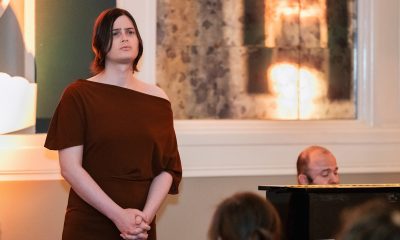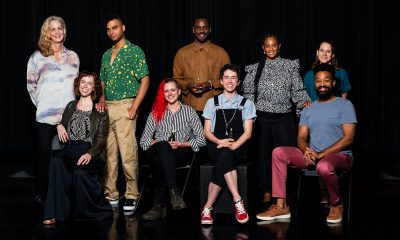Arts & Entertainment
In full ‘Force’
Washington National Opera’s modern production restores a Verdi classic
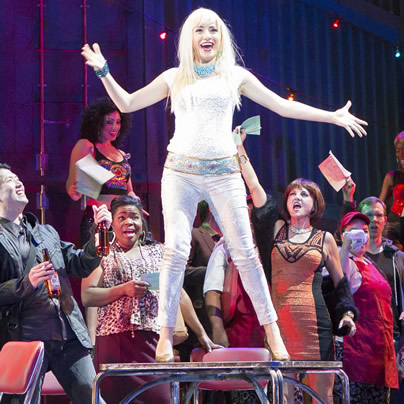
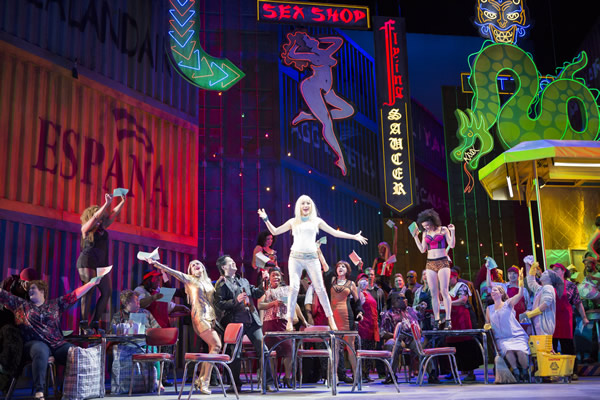
Washington National Opera’s Verdi reboot gives the show a bold, modern setting. (Photo by Scott Suchman; courtesy WNO)
‘The Force of Destiny’
Through Oct. 26
The Kennedy Center
2700 F St., NW
Tickets $25-$300
kennedy-center.org/wno
202-416-8500
As conductor Xian Zhang mounted the podium Saturday evening for the Washington National Opera’s opening night of “The Force of Destiny,” the audience seemed to lean in, eagerly anticipating the driving overture that is the work’s most recognizable calling card. Yet, only silence remained. The curtain rose on a dumb-show dinner scene in a luxurious home, where a family broke bread and a maid stood anxiously by the large window, looking out into the blackest of nights.
Like the unsuspecting characters of Giuseppe Verdi’s sweeping work “La Forza del Destino” (WNO oddly translates the title into English), the audience would have to wait for destiny to come to us on its own terms. Director Francesca Zambello’s creative opening gave the story an unexpected immediacy, especially as the tragic events surrounding the heroine Leonora (Adina Aaron) and her lover Don Alvaro (Giancarlo Monsalve) unfolded in the first scene. Once the die was cast, however, the overture blared from the pit as an interlude between the life the protagonists dreamed of and the tumultuously bloody years ahead.
Zambello, a lesbian, moved the drama from the mid-1800s to the present day, complete with signs advertising sex, pole dancers displaying their wares outside a club and costumes evoking a city’s downtrodden, but this change of scene isn’t done thoughtlessly to bring in new opera fans. It actually works — beautifully at times.
Leonora, costumed as a vagrant, flees her broken family home and the wrath of a brother hell-bent on killing her, and lands outside an urban monastery, with graffiti scrawled on its walls and a neon cross over the door. Yet, as she drops to her knees and begs God to rescue her from this miserable life, the plight of the modern-day heroine seems less antiquated and more real, reminding us of our own dark nights of the soul when we’ve turn to a God we may or may not believe in to see us through ‘til dawn.
The vision doesn’t always work seamlessly — penitent monks wandering through a raucous, sex-crazed street crowd seems more fitting for an earlier era — but the production takes what can be a tottering opera and restores it to a seat reserved for Verdi’s best musical and dramatic writing.
‘Forza’ is not an easy work to cast, given the intense demands for protagonists and chorus alike, but under Zhang’s evocative baton, the artists delivered crackling, if not always subtle, performances.
Aaron was an electrifying presence, her body trembling with pathos, almost as if she was unable to control the power coursing through her. Her final act aria, the famed “Pace, Pace, mio Dio,” was simply perfect in both vocal and dramatic delivery. It may have been opening night nerves, but elsewhere in the opera, she sometimes sped through passages that required focused negotiation between a marvelously dark chest voice and her more velvety middle register, and a couple of notes sounded a hair off-pitch. Hopefully, these kinks will iron themselves out, because her overall performance is spectacular.
The lower-voiced roles took home the prize among the men. Mark Delavan’s Carlo never seemed to flag over the course of a long evening, his rich tone creamy from bottom to top. Italian bass Enrico Iori was a sumptuously formidable, yet also delicately heartbreaking, Father Guardino, and the rousing chemistry between him and Aaron makes one wonder what the two could make of “Don Carlo.”
The dark tenor hero Don Alvaro is a complex role. His music often sits in places tenors would rather muscle through in order to sail onwards to their glorious high notes, and the character’s emotional journey is deliciously multifaceted. Monsalve delivered acting in spades, giving us a sexy and then tormented Alvaro, but his singing was uneven. He seemed capable of only two dynamic choices — shout and bellow — and while, when appropriate, those choices were lovely, they made for a loud night.
By the opera’s end, though, when death had claimed so many and forgiveness seemed like the frailest of hopes, it was Zambello who walked away with the crown for a production that not only made us listen, but also made us think.
Theater
Celebrating the 2024 Helen Hayes Awards nominees
38th annual event returns next week ‘building on last year’s success’

2024 Helen Hayes Award
May 20, 2024
For tickets go to theatrewashington.org
It’s that time of year again when the DMV’s theater pros and those who love them getdolled up and show up to celebrate the best of last year’s work.
On Monday (May 20), Theatre Washington’s Helen Hayes Awards marks its 38th year with a splashy ceremony at The Anthem on the District Wharf. With two parts, a non-rushed intermission, and a lively after party, the program is long but the format allows time to celebrate award recipients, enjoy the entertainment, and talk about some serious issues without racing to the end.
Co-directed by Will Gartshore and Raymond O. Caldwell, the show features four terrific hosts — out actor Tom Story, Felicia Curry, Maria Rizzo, and Rayanne Gonzales along with an ensemble of five singer/dancers (dubbed the Fab Five) peppering the show with some fun numbers.
“We’re building on last year’s success,” says Amy Austin, Theatre Washington’s out president and CEO. “Again, dinner will be served during the show à la Golden Globes on the first floor for mostly nominees and their guests, and the second floor offers lots more affordable stadium seating.”
Austin’s approach harks back to the sumptuous Helen Hayes Awards of yesteryear, which she cleverly remembers as the “ice sculpture age.” Ultimately, the goal is to create something fun, memorable, and meaningful: “It’s such a collaborative community and that’s why the Helen Hayes Awards are special; it’s a reunion of people who’ve worked together.”
Still, the doling out of awards remains the focus of the long evening. And that leaves a lot of nominees waiting on tenterhooks to see just who will go home with prizes named for the legendary first lady of American theater, Miss Helen Hayes.
The awards selection process is no simple task, she adds. Recognizing work from 151 eligible productions presented in the 2023 calendar year, nominations were made in 41 categories and grouped in “Helen” or “Hayes” cohorts, depending on the number of Equity members involved in the production with Hayes counting more.
The nods are the result of 49 carefully vetted judges considering 2005 individual pieces of work, such as design, direction, choreography, performances, and more. Productions under consideration in 2023 included 44 musicals, 107 plays, and 36 world premieres.
As one of this year’s nominees, out actor Justin Weaks says he isn’t about beating the competition. He concedes it may sound cliché, but it’s a privilege simply to be nominated, especially with all the work done in the DMV. And certainly, with three wins and multiple nominations under his belt, he’s in a position to know.
And now, he’s nominated for Outstanding Supporting Performer in a Play, for his notable turn as Belize/Mr. Lies in Arena Stage’s production of Tony Kushner’s seminal masterwork “Angels in America, Part One: Millennium Approaches.”
For Weaks, a longtime D.C. actor who relocated to New York in 2021, the “Angels” experience was singular: “It’s one of those great, very American plays that remains relevant, and that it’s centered on the gay experience and HIV/ AIDS makes it especially impactful for the queer community.”
Often noted for creating roles in new plays, Weaks enjoyed being part of a piece that so many hands have touched since its premiere more than 30 years ago. He was thrilled to work with the production’s Hungarian director János Szász who, Weak says, approached the piece as a new work, treating it like fresh text.
And does Weaks have a speech prepared?
“The morning of the awards, I’ll journal about my experience with ‘Angels,’ and if my name is called, I’ll get up and give an abbreviated version of what I wrote. But mostly for me, it’s a reunion, a chance to be cute, get dressed up and celebrate the work.”
In the Outstanding Lighting Design category, Brooklyn-based Venus Gulbranson is nominated for Woolly Mammoth Theatre Company & The Wilma Theater’s “My Mama and the Full-scale Invasion”. It’s the proud and out Filipino designer’s second nomination (last year she received a nod for Monumental Theatre’s “tick, tick… BOOM!”).
“Lighting design is underrated in the eye of theatergoers,” explains Gulbranson who earned her lighting stripes as an Arena Stage fellow. “Scenic and costume design are somehow more tangible to them; they don’t often realize that it’s lighting designers who navigate the mood of the story.
“It’s a very empathetic skill, and a good designer can take you there emotionally. When you’re tearing up watching a scene, the lighting has a lot to do with it. We also spend a lot of time making scenes transition smoothly,” she adds.
“We half-jokingly say ‘a compliment to set design is a compliment to us.’ We are the reason there are beautiful colors on stage. Scenery is our canvas.”
Other queer nominees include Bobby Smith (Studio Theatre’s “Fun House”), Billie Krishawn (Arena’s “Angels in America”), Miss Kitty (Spooky Action Theatre’s “Agreste”), Michael Urie (The Kennedy Center’s “Monty Python’s Spamalot”), costume designer Frank Labovitz (Constellation Theatre Company’s “The School for Lies”), director Jason Loewith and set designer Tony Cisek (Round House Theatre & Olney Theatre Center’s “Ink”), and most likely more.
Both the Helen Hayes Awards’ choreographer and a nominee, David Singleton is up for Outstanding Choreography in a Musical for NextStop Theatre Company’s “Ride the Cyclone,” a wildly entertaining dark comedy.
“The show’s score is eclectic, so I could do a little bit of everything. I had to find anchor points for each number where I draw most inspiration, and go with it. I have a strong jazz background, both street and musical theater jazz, but I’m also really into tap and some ballet.”
Singleton began performing professionally in “Dreamgirls” at Toby’s Dinner Theatre in 2017, but he hit his stride with “really fierce” choreography post pandemic.
A dancer first, Singleton says his energies are divided into thirds: performer, choreographer, and drag queen (Tiara Missou, an “incredibly vain but kind queen” who’s regularly featured at D.C. bars Pitchers and Shakers). When Singleton was 18, he volunteered to work the Helen Hayes Awards. He recalls thinking “I’ll be part of this one day, for what exactly I’m not sure” and now he says, “I’m here and I feel honored.”
And what about a prepared speech? “Oh, definitely. I’m a rambler.”
Break legs nominees!
A full list of award recipients will be available at theatrewashington.org on Tuesday, May 23.
Television
‘Interview with the Vampire’ returns in triumph
Long-awaited season 2 continues to get story exactly right

When AMC debuted its long-awaited series adaptation of “Interview With the Vampire” – Anne Rice’s seminal proto-postmodern horror novel that set the stage and paved the way for a decades-long literary franchise that has kept millions of readers, queer and straight alike, passionately engaged since first reading its thinly veiled allegorical document of life as a being with heightened awareness on the edge of human existence – in 2022, we were among the first to sing its praises as a triumph of narrative storytelling,
We were not the last. The series, created by Rolin Jones in collaboration with Christopher Rice – the original author’s son and a successful horror novelist in his own right – and the late Anne Rice herself, was one of its season’s best-reviewed shows, earning particular praise for its writing, in which the queer “subtext” of Rice’s original works was given the kind of unequivocal full weight denied to it in the Brad Pitt/Tom Cruise-starring Neil Jordan-helmed film adaptation from 1994.
Though purist fans of the original boom series took occasional umbrage to some of the show’s leaps – changing the historical period of the story to illuminate themes of racism and deepen its resonance for those living as “others” on the fringe of society, and making the book’s protagonist, Louis Pointe du Lac (Jacob Anderson), a closeted Black Creole man in early 20th-century New Orleans – the series won most of its naysayers over by its season finale. It delivered a deliciously subversive, unapologetically queer interpretation that remained true to Rice’s original gothic re-imaginings while expanding the scope to encompass social and cultural factors that have become central to the moral and ideological conflicts that plague us in the first quarter of the 21st century.
To put it bluntly, the show’s willingness to embrace the story’s countercultural queer eroticism and place its transgressively amoral “moral compass” front and center was more than enough to smooth over any nitpicking over faithfulness to narrative detail or tone that might otherwise have kept Rice’s legion of acolytes from signing on to the new-and-contemporized vision of the book that Rollins built as the foundation for his daunting project.
Now, after a buzz-tempering delay borne of last year’s actor’s strike, the series has returned for its second season. And we’re happy to assure you that its feet hit the ground running, keeping up both passion and narrative momentum to pick up the story with electrifying energy after leaving off (at the end of season one) with the shocking murder and seeming elimination of Lestat (Sam Reid), the exquisitely amoral “rock star” vampire who served as both protector and lover of Louis, and the departure of the latter and his perpetually juvenile “daughter,” Claudia (Bailey Bass) on s quest to find others like themselves.
Fans of the book might, in fact, find new reasons to take exception to the show’s adaptation, which, as in season one, makes significant departures from the original narrative. After moving the story’s setting forward by roughly half a century, Louis and Claudia’s secretive sojourn now takes place in the traumatized landscape of post-WWII Europe, and spins a scenario in which the two ex-pat vampires, navigating their way through the perils of Soviet-occupied Central Europe after the fall of the Nazi regime, spend time in a refugee shelter while investigating rumors of old-world vampires who might provide a link to their “family history.”
When we rejoin this pair of relative fledgling vampires, their undead existence is a far cry from the decadent elegance they enjoyed in the New Orleans setting of season one. Enduring a near-feral existence as they make their way through a war-ravaged landscape, they find no shortage of prey in the aftermath of the Third Reich, but the “creature comforts” of their former “afterlives” are now only a memory. Louis is devoted, as always, to Claudia (now portrayed by Delainey Hayles, presumably due to scheduling conflicts for original actor Bass, who is set to reprise her role from “Avatar: The Way of Water” in the next installment of filmmaker James Cameron’s high-dollar sci-fi franchise), but remains haunted by his vampire maker and former lover Lestat, whose undead corpse remains buried on another continent but whose charismatic presence manifests itself in his private moments, nonetheless. In the first episode, the pair have used their supernatural wiles to journey into the “old country” long associated with their kind, tracking human tales of monstrous terrors in the night in hope of connecting with more of their kind. Louis, as always, struggles with his compassion for the mortal beings around him, while the more savage Claudia simply sees them as prey, and holds little hope of finding other vampires, if they even exist. For her part, Claudia has forgiven – but not forgotten – his refusal to ensure Lestat’s demise by burning his body, and is now solely focused on finding others like her.
Of course, the adventures of these two undead companions are only half the equation in “Interview With the Vampire.” The past is, as always, merely a flashback, as Louis relates the story of his afterlife experiences to mortal journalist Daniel Molloy (Eric Bogosian). In the present, the skeptical Molloy casts doubt on the truth of his memories, forcing the vampire to re-examine them as he goes. Perhaps more interestingly, in the long game of a series which, if it comes to full fruition, will eventually encompass the entire Rice vampire saga, these contemporary scenes give us a look at the relationship between Louis and Armand (Assad Zaman), revealed in the season one finale to be not a mere servant in Louis’ household but a centuries-old fellow vampire who is now Louis’ lover and companion.
Fans of the books, of course, know that Armand plays a significant role in the story of the past, too, and while we won’t spoil anything, we can say that history begins to unspool as season two progresses – but that’s getting ahead of ourselves. For now, what we can say is that season two’s first episode, while it may veer away from the familiarity of Rice’s original tale in service of reimagining it for 21st-century audiences, continues the first season’s dedication to breathing thrilling new life into this now-iconic, deeply queer saga; superb performances all around, an elegantly cinematic presentation and literate writing, and a lush musical score by Daniel Hart all combine to sweep us quickly and irresistibly into the story, making us not just fall in love with these vampires, but want to be one of them.
That, of course, is the gloriously sexy and subversive point of Rice’s “Vampire Chronicles,” and this long-awaited series continues to get it exactly right.
Out & About
Pride Run 5K nearly sold out
Front Runners annual event to be held at Congressional Cemetery

Sign up now to join the annual Front Runners Pride Run 5K. The event is 85 percent sold out. The event is Friday, June 7 at Historic Congressional Cemetery.
Join more than 1,000 runners and walkers as they kick off Pride weekend 2024. When registering please consider donating to one of the event’s charity partners. This year’s race proceeds benefit local LGBTQ and disenfranchised youth organizations, including the Team DC Student-Athlete Scholarship, Wanda Alston Foundation, Blade Foundation, Ainsley’s Angels of America (National Capital Region), Pride365 and SMYAL. Visit DCPriderun.com to register or to donate.
-

 South America2 days ago
South America2 days agoPeruvian government classifies transgender people as mentally ill
-
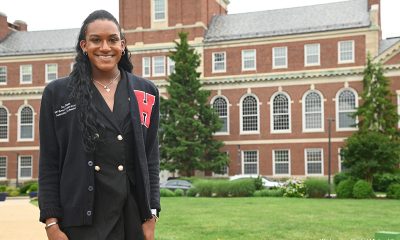
 District of Columbia2 days ago
District of Columbia2 days agoMeet Jay Jones: Howard’s first trans student body president
-

 Africa4 days ago
Africa4 days agoUgandan president meets with US ambassador
-

 a&e features2 days ago
a&e features2 days agoWhat’s new at Rehoboth Beach for summer 2024

